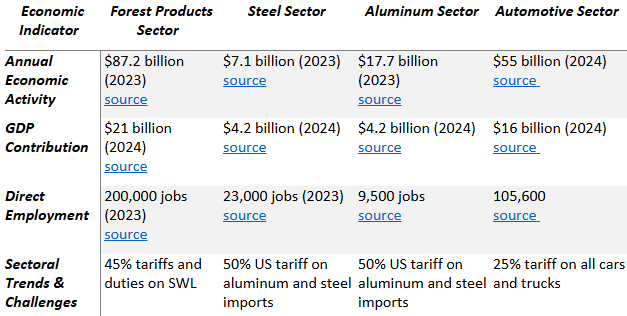Forest sector directly employs 200,000 Canadians (plus another 200,000 indirectly)
Forestry directly employs over 200,000 Canadians and supports another 200,000 jobs across transportation, maintenance, and manufacturing. The stability of hundreds of rural and northern communities depends on a strong and predictable forest sector.
However, Canada’s forest product sector—an essential part of the North American economy—continues to face unfair and punitive U.S. trade actions. The ongoing use of Section 232 tariffs on Canadian softwood lumber and derivative products has raised average combined tariffs and duties to 45 percent. These measures are unjustified and protectionist, ignoring decades of evidence that Canadian lumber supports, rather than threatens, U.S. economic and national security interests.
Targeting responsibly managed, sustainably sourced Canadian wood products under the guise of national security has been deeply damaging to both countries. Our sector has proven itself a dependable partner in North America’s economic strength, supply chain security, and resource independence.
"The interconnected nature of our industry means that if sawmills are forced to slow down or halt production, pulp mills other downstream production are also affected. The entire forest sector supply chain is at risk due to these tariffs,” said Derek Nighbor, FPAC President and CEO. “We're already experiencing shift reductions at mills, curtailments, and prolonged shutdowns for repairs and maintenance. As the trade dispute drags on, these challenges will only intensify.”
FPAC urges the Government of Canada to apply the same focus and determination to resolving the softwood lumber dispute as it has demonstrated for other important export sectors. Leadership is required on both sides of the border to restore predictability and fairness to one of North America’s most integrated and mutually beneficial trade relationships.
On Wednesday, October 22, national forest sector leaders and provincial partners gathered in Ottawa with policymakers, Indigenous partners, researchers, and environmental organizations tackle the biggest economic challenges for our sector and our country. Forestry and forest sector products play a vital role in supporting Canada’s trade, regulatory, and housing priorities.
To keep Canada competitive, policy-led growth is possible. Today FPAC released: We Grow to Build Canada: A Forest Sector Action Plan for Canada’s Government which defines three priorities for the governments support of the sector:
• PROTECT forest sector employees in U.S. trade talks.
• IMPROVE operational and mill competitiveness through innovation and more efficient regulation.
• BUILD more homes with Canadian wood.
Forest Sector Facts

FPAC provides a voice for Canada’s wood, pulp, and paper producers nationally and internationally in government, trade, and environmental affairs. As an industry with annual revenues exceeding $87.2B, Canada’s forest products sector is one of the country’s largest employers—providing 200,000 direct jobs and operating in hundreds of communities across the country. Our members are committed to collaborating with Indigenous leaders, government bodies, and other key stakeholders to develop a cross-Canada action plan aimed at advancing forest health, while supporting workers, communities and our environment for the long term.
Contact
Rebecca Rogers, Director of Communications
613-563-4518
Follow FPAC on LinkedIn










.jpeg)

